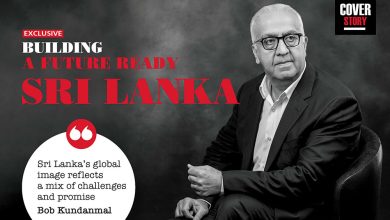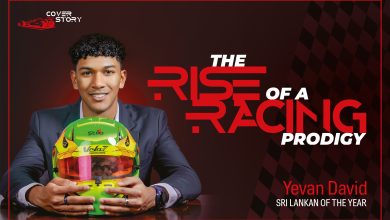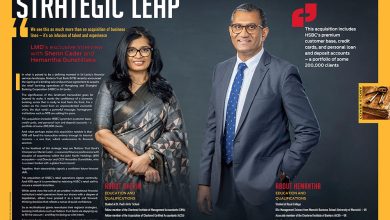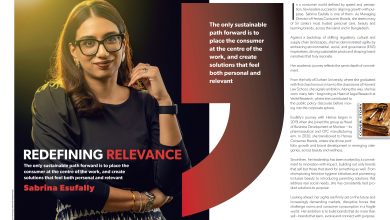COVER STORY
 THE PRESIDENTIAL ELECTION
THE PRESIDENTIAL ELECTION
ELECTION WATCH
Spotlight on the presidential poll
PUBLIC PERCEPTIONS As the self-styled ‘voice of business,’ LMD’s mission is to shape opinion, promote corporate excellence and stop corruption – and the upcoming presidential election would be a litmus test of the people’s resolve to elect a candidate who has the potential to meet such aspirations. In this edition, we cover virtually every angle in the lead-up to the election with a focus on five presidential aspirants who were selected on the basis of a snap social media survey conducted by LMD soon after nominations were handed in on 7 October – respondents were asked to name the ‘five main contenders’ (i.e. candidates who poll respondents believed would have a chance of winning the election). The results of this Facebook poll had the five front-runners as follows: Mahesh Senanayake, Sajith Premadasa, Gotabaya Rajapaksa, Anura Kumara Dissanayaka and Rohan Pallewatta.
THE EXECUTIVE POLL
FACTS DON’T LIE
A synopsis of Sri Lanka’s presidential polls to this day – compiled by Zulfath Saheed

The president is the executive head of state and government of the Democratic Socialist Republic of Sri Lanka, as well as the commander in chief of the Sri Lanka Armed Forces. It remains the single most dominant political office in the country and was created in 1972 to represent the head of state, later subsuming the title of head of government in 1978.
Presidential elections have been held on seven occasions in the nation’s post-independence era – viz. in 1982, 1988, 1994, 1999, 2005, 2010 and 2015. And on 16 November, Sri Lankans head to the polls once again in what is being touted as the most expensive vote in the country’s history with a record 35 candidates standing for public office.
Year 1982 marked the first presidential election of Sri Lanka. Described as a contest between socialism and capitalism, the inaugural poll witnessed the candidature of Hector Kobbekaduwa from the Sri Lanka Freedom Party (SLFP) and J. R. Jayewardene of the United National Party (UNP) with the latter garnering nearly 53 percent of the vote and being declared president.
Sri Lanka’s second presidential ballot in 1988 is considered to have been among the most violent in the country’s electoral history. Held at a time of national chaos amid insurgencies both in the north and south of the island, it also witnessed the lowest ever voter turnout. The UNP’s Ranasinghe Premadasa emerged as the winning candidate by defeating his chief SLFP rival Sirimavo Bandaranaike.
Chandrika Kumaratunga of the People’s Alliance (PA) – a collective of political parties including the SLFP – was elected Sri Lanka’s first woman president following the 1994 poll. Kumaratunga’s main challenger was Srima Dissanayake who entered the race during the latter stages following her spouse Gamini Dissanayake’s assassination on the campaign trail.
The fourth presidential election witnessed Kumaratunga being reelected for a second term. In 1999, the UNP fielded Ranil Wickremesinghe as its candidate and he drew only 43 percent of the votes cast compared to Kumaratunga’s 51 percent.
In 2005, Mahinda Rajapaksa of the governing United People’s Freedom Alliance (UPFA) entered the presidential fray – albeit amid doubts of whether an election would be held as Kumaratunga had called the ballot a year ahead of schedule. He would go on to defeat Wickremesinghe at the polls although only 180,786 votes separated the two candidates.
Rajapaksa rode a postwar high in being reelected president in 2010, the result of him seeking a fresh mandate prior to the expiration of his first term in 2011.
The former commander of the Sri Lankan Army General Sarath Fonseka – who was endorsed by opposition parties including the UNP and Janatha Vimukthi Peramuna (JVP) – was his main opponent in the election.
The 18th Amendment to the Constitution of Sri Lanka removed the limits on the number of terms that a president may serve and meant that unlike his predecessors, Rajapaksa could stand for a third term (Note: The subsequent 19th Amendment passed in parliament on 28 April 2015 annulled the 18th Amendment and deemed that no person twice elected to the office of president shall be qualified thereafter to be elected to such office).
However, his move to call for a presidential poll earlier than required backfired with Rajapaksa facing defeat at the hands of today’s incumbent and one-time ally Maithripala Sirisena in 2015.







Your Election Special is very informative and balanced. I would like to say that you should have covered a few more candidates because there are as many as 35 of them but what you have here is an in depth analysis of the three main candidates and two others. For me, the JVP leader makes a lot of sense and has answered your questions to the point.
On the issue of corruption, there are some good answers but I am not sure whether such promises will be met, especially because Parliamentary elections will be held sometime soon. We hope the country will be in safe hands for the next five years as we have to advance as a country.